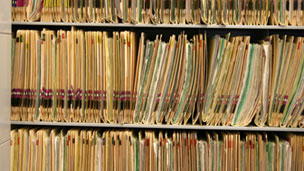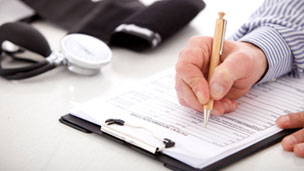When it comes to hospital bills, it pays to question everything. There are no firm figures available, but some industry experts estimate that there are errors in 40% to 80% of all medical bills. Even at 40%, that's a high error rate; 80% is astounding. So hospital billing errors are a fact of life, and a good place to start cutting costs. Errors might mean you were overcharged a few hundred, a few thousand or even tens of thousands of dollars. Even with health insurance, incorrect billing can make out-of-pocket expenses painfully higher than they should be. 1. Keep Track
Whether it's a quick trip to the emergency room or a protracted stay in the hospital, keep a log of admission and discharge times, and every test, treatment and medication the patient receives; if you're the patient and are too sick to do it yourself, ask a friend or family member to do this. Even just a few scribbled notes can make it easier to decipher the bills when they start arriving. | 
| 2. Gather Documents
Hospitals typically send what is called a summary bill, listing most charges under broad categories such as pharmacy, radiology or surgical supplies. However, most hospitals also have a Patient's Bill of Rights that requires them to provide a detailed bill for free, upon request. So, request one. If it's still hard to understand those itemized charges, ask the hospital's medical-records department for a copy of the doctor's orders and the nursing notes, which will include all the procedures, treatments and drugs the patient was given. Also ask for a copy of the UB04, the detailed bill that hospitals send to insurance companies. | 
| 3. Review the Personal Data
If the patient's name is misspelled or the insurance group number has a typo, the insurance coverage being applied might be incorrect. Also check that the bill includes the right level of hospital room and care provided, such as a semi-private or private room, and skilled or intensive care. In an emergency room setting, care is typically described as level 1 (for basic care, like a nose bleed) to level 5 (emergency care, such as a serious injury or a heart attack). | 
| 4. Confirm Dates and Times
Compare the exact number of daily room-and-board charges on the bill against the admittance and discharge times. Most insurance plans do not allow the hospital to charge for the day of discharge, so ask questions if the bill includes the patient's discharge day.If the hospital bill includes surgery, check the length of time listed, particularly if the operation started later than originally scheduled. Operating-room use can be billed at various rates from about $69-$270 per minute -- which works out to $4,140-$16,200 an hour. | 
| 5. Watch for Duplication or Services Never Received
Clerical errors happen. Frequently. It's not unusual for charges for a single test or procedure to be billed more than once, or for the bill to list more medication than was actually administered. Check the doctor's notes against the bill: if the doctor ordered a test and then cancelled it, make sure that you weren't charged for a test that was never done. | 
| 6. Skim for "Unbundled" Items
Related standard lab tests are often "bundled" together in a package for a lower charge than if each were performed separately. If several lab tests were done on the same day and billed separately, check with your insurance company to see if they should be billed as a package, for one lower fee. Also watch for kit, tray or room fees; make sure those items aren't also billed separately. Question any terms that are unclear; "oral administration fee" is for having a nurse hand the patient medications, and it should be included in the standard hospital room fee. | 
| 7. Look for Brand Name and Generic Drugs
If the bill lists brand-name medications, were they necessary and did you know in advance that brand names drugs were being used instead of less-expensive generics? If the doctor orders a readily available generic drug but the hospital provides the more expensive brand-name medication without the patient's knowledge and consent, the patient should not be responsible for the increased charge. | 
| 8. Check the Codes
Every medical diagnosis is assigned a code number, for billing and insurance purposes. A slight change in the code can indicate a more serious condition, requiring more costly procedures and treatments. Check the codes on the hospital bill against the codes in the doctor's orders and nursing notes; if they don't match, ask detailed questions about why they changed, and the affect on overall costs. | 
| 9. Watch the Decimal Points
There's only a single decimal difference between $87.00 and $870.00, but misplaced decimal points can significantly increase the total cost of a hospital bill. Again, clerical errors do happen, so read through the bill for amounts that don't make sense, and question anything that you don't understand. A charge of $200 for two Tylenol may seem outrageous but still be accurate, while a $2,000 charge for two Tylenol could possibly be due to a misplaced decimal point (at least, one can only hope that's the case). | 
| 10. Consider Hiring a Consultant
For overwhelmingly large hospital bills, there's a completely new category of professionals. Called medical billing advocates, medical bill reviewers, medical bill consultants, or claims assistance professionals, these independent contractors search out errors in medical bills, negotiate lower fees from medical care providers and challenge insurance coverage denials. The service isn't free -- some charge by the hour ($50-$175) and others a percentage (15%-35%) of the amount saved. Search for these consultants through the Alliance of Claims Assistance Professionals or the Medical Billing Advocates of America. |  |
Reviewing a hospital bill can be tedious, but a bit of effort might save a lot of money.
|